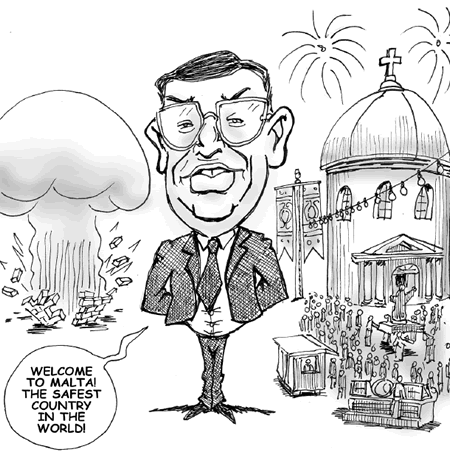It is often pointed out that here in Malta, there has to be some sort of tragedy for us to finally come to our senses, and to address issues that would otherwise remain ignored for years.
In the case of fireworks, however, it seems that not even multiple tragedies are enough to shake us out of our state of national torpor. Last week’s umpteenth fireworks factory explosion, which cost the life of one man and left another in a critical condition, is as clear an example as one can get of our remarkable tendency to keep ducking our responsibilities towards the health and safety of the general public. In fact, the situation regarding pyrotechnics is clearly going from bad to worse.
The statistical incidence of fatal fireworks accidents in recent times – six deaths in the past six months alone – appears to indicate that safety standards at fireworks factories have deteriorated over time, instead of improving as one would have every reason to expect. This is itself an indictment of the pyrotechnics situation in Malta, which is largely dominated by amateurs with no apparent training in safety issues, and who operate in conditions which should by rights be considered unacceptable in any serious EU member state.
But more significantly, our steadily worsening record of fireworks fatalities speaks volumes of the shocking disregard for human life and limb displayed by the authorities concerned. As things stand, all the initiatives supposedly set up to address the issue of fireworks safety – each of which was also triggered by similar fatalities in the past – have fizzled out literally like a damp squib. Four months ago, shortly after the St Helen’s Fireworks Factory explosion which claimed five lives in Birkirkara, Justice and Home Affairs Tonio Borg set up another commission to look into the issue. This newspaper questioned the wisdom of this initiative at the time, especially considering the fact that the AFM’s Explosives Committee had already presented a report on the safety of fireworks factories in Malta in 2004… which report appears to have been totally ignored.
Now that five lives have been lost, it is too easy to see why the contents of this report have been a jealously guarded secret for four whole years. We now know that the advice given to former Prime Minister Eddie Fenech Adami was to close down the St Helen’s Factory in Gharghur, among others, precisely on the grounds that it was unsafe. This recommendation fell on deaf ears, and five men are now dead as a result. As usual, nobody has to date taken political responsibility for this utterly avoidable tragedy.
One would think that the June 28 disaster would have sufficed to alert the present government to the urgency of taking serious action once and for all. But in what appears to a repeat performance of the St Helen’s tragedy, yet another factory went up in smoke last week, adding yet another name to the long list of fireworks fatalities in Malta. Admittedly we do not know if the St Catherine’s Factory in Zurrieq was among the factories recommended for closure by the Explosive Committee in 2004. But it is amply clear that the present administration is unwilling to address the issue of fireworks safety, even in the face of a steadily mounting death toll.
The newly set up Pyrotechnics Commission, headed by Mr Carmel Magro, has yet to produce its overdue report four months after its inception in July. Originally the deadline for these recommendations was October – a month before last week’s explosion. However, this deadline was not kept for reasons which have never been explained. Instead, Minister Borg simply extended the deadline by another month. It is worth pointing out that the Zurrieq tragedy took place after the original deadline had elapsed.
Meanwhile, matters have become decidedly more sinister thanks to Minister Borg’s repeated refusals to release any information regarding inspections of factories over the past few years. Opposition tourism spokesman Evarist Bartolo some weeks ago tabled a Parliamentary Question regarding the Explosives Committee’s so-called Inspections Unit, but the question was brushed aside by the Deputy Prime Minister without any satisfactory explanation. This newspaper considers this an utterly unacceptable state of affairs, given the fact that so may lives have already been lost precisely on account of substandard health and safety conditions in fireworks factories.
We now look forward to the Pyrotechnics Commission’s report, expected in the coming weeks, in the hope that its recommendations will serve to seriously reduce the chances of further unnecessary deaths in future. However, much will depend on whether the government will act on its report, whenever – if ever – it is produced.
Every day that passes until action is finally taken, is a day in which yet another factory might explode, endangering the lives of the fireworks enthusiasts themselves, and also those people unfortunate enough to reside in the vicinity. How many more deaths will it take until the persons responsible finally take the necessary decisions? Our guess, unfortunately, is “too may”.


